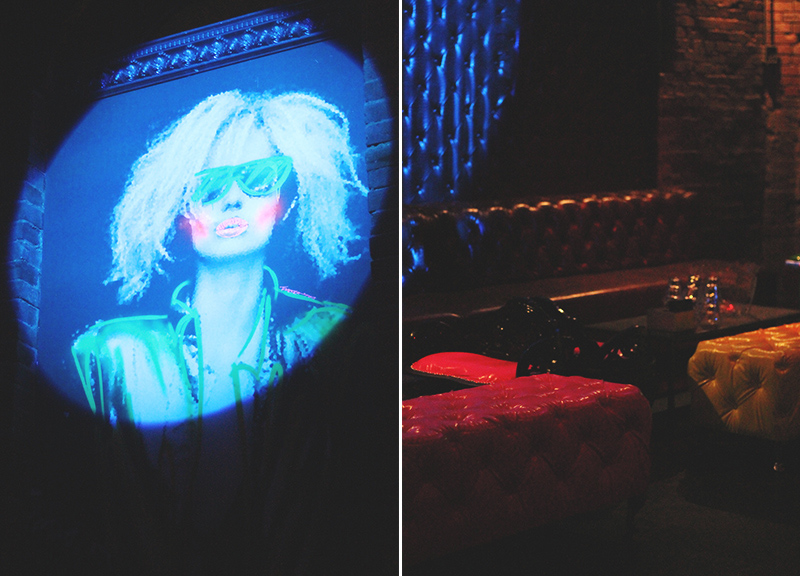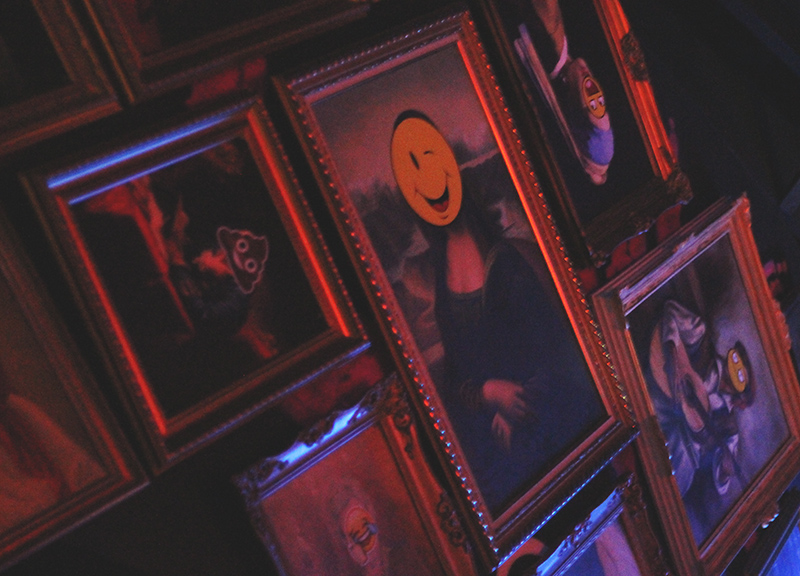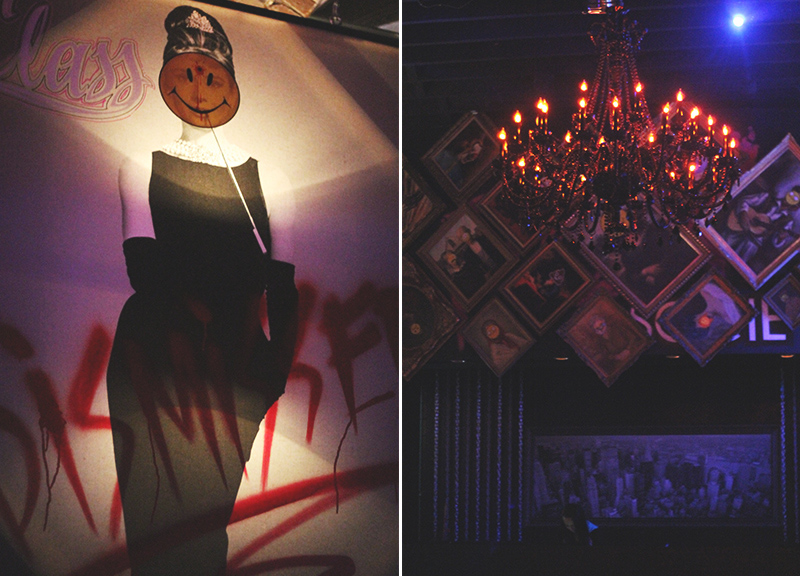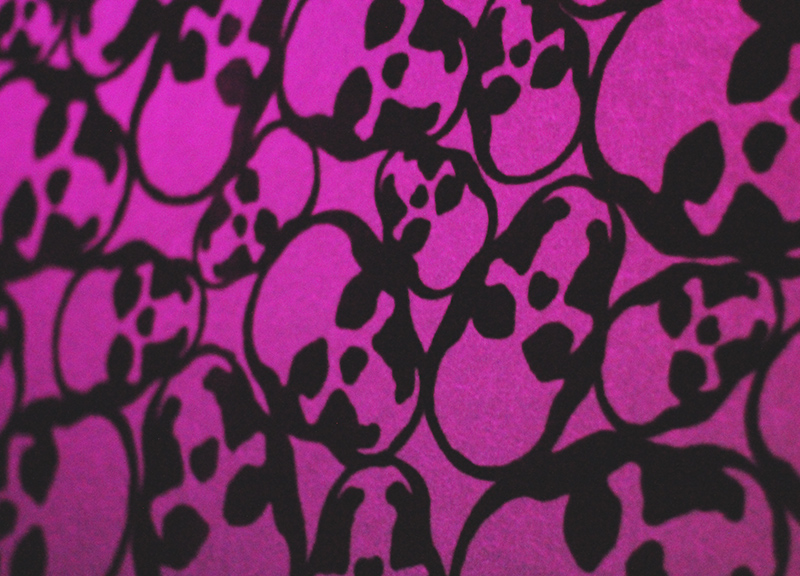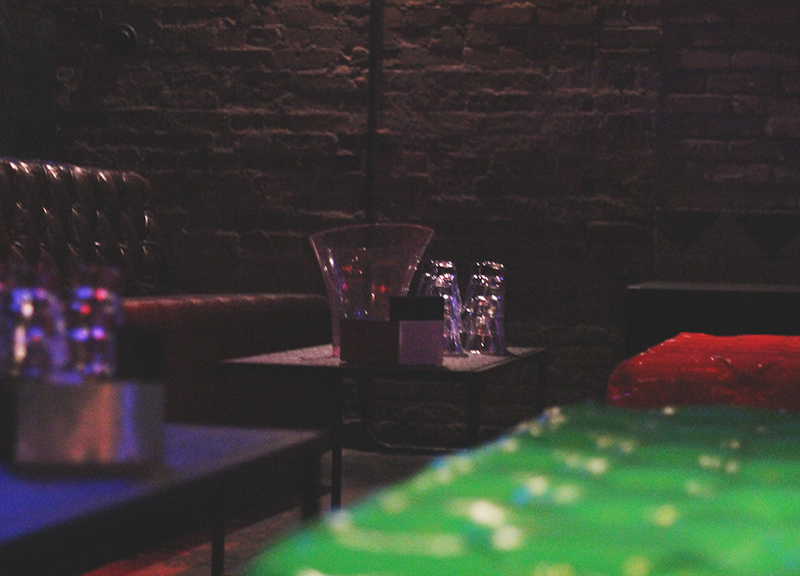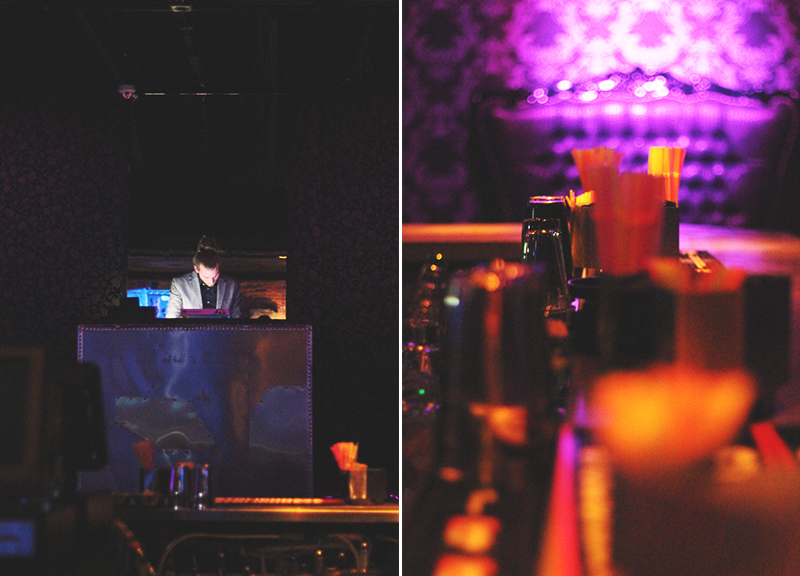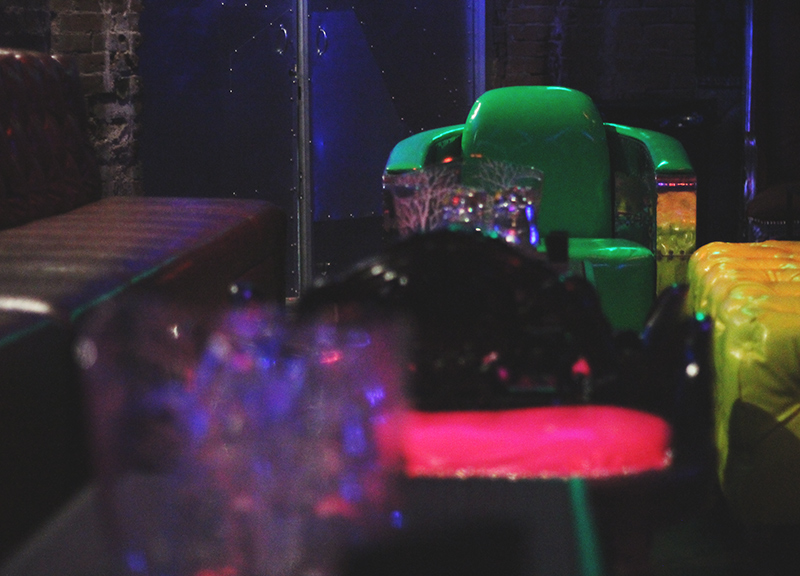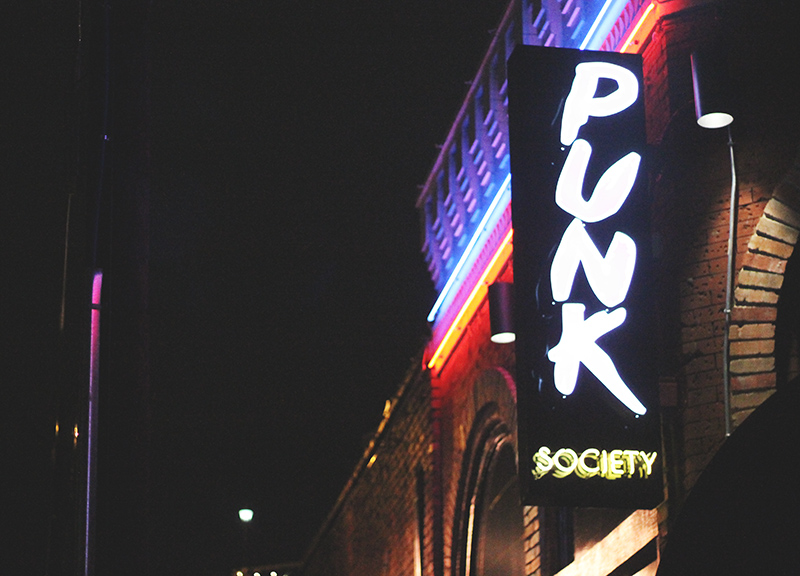Is Punk Society The Worst Thing To Ever Happen To Deep Ellum Or Is Everyone Overreacting?
Pretty much as soon as Punk Society hung its bright, light-up pink sign outside of its door at 2723 Elm Street, the neighborhood started talking. And the chatter hasn't really let up in the weeks since.
No, you haven't had to strain your neck of late to hear someone in Deep Ellum complaining about this new space in the home of the old Boiler Room, knocking it for its Hot Topic-like logo and/or bitching about what its arrival means for the future of things in this part of town. Sometimes the chatter even comes right up to Punk Society's front door: At about 10 p.m. on Saturday, the club's third-ever night in business after softly opening the previous weekend, a small group of revelers — passing the spot on the way to some of Elm Street's more established nightlife destinations — could be heard openly and loudly mocking the notion of Punk Society's existence as they strolled along.
“It just looks so lame,” one of the women in that crew exhaled at one point, much to her pals' glee.
The well-dressed bouncer standing out front and nearby couldn't help but hear that slight. He just stood there and took it, waiting to roll his eyes until they'd gone.
It's been a curious couple-year stretch for this address. It used to house the Daddy Jack's seafood joint before that entity pulled out in 2009, thus paving the way for the Boiler Room, which started as restaurant that was then rebranded as a halfhearted rock club. Of course, that venture failed about as quickly as anticipated, although it then rebounded just as fast with Drowning Pool bassist Stevie Benton coming in and resuscitating it in 2011. Somehow, that incarnation survived four years without ever developing an identity or regular crowd, although that run too came to its end this summer when the place bit the bullet and closed, promising “mystery” investors and a new concept to come.
On the whole, Deep Ellum, which likes to at least think of itself as pretty punk rock regardless of how accurate that may actually be these days, bristled immediately when it was revealed that said new concept would be referring to itself as Punk Society. Also maybe not helping matters? That said new “mystery” investors include Gregg Bothwell and Mark Beardon, who are among the owners at the sticks-out-like-a-sore-thumb sorta-speakeasy Truth & Alibi. But for all of the ire T&A has drawn since opening in June of last year, there's no denying that his place found itself an audience; anyone who's ever been stuck in traffic on Elm Street behind a the stream of Ubers pulling into T&A could tell you that the place seems to do decent business.
Per Bothwell himself: Yeah, T&A is doing well, and that's part of why he and Beardon were up for joining their “personal friends” among the Boiler Room crew — those Drowning Pool connections will remain intact for the 200-or-so-capacity room — in its re-branding effort, which took some four months to pull off.
Inside, neon ottomans and benches rest alongside velvet chairs. Paintings of cartoon-abetted images of pop culture icons hang over a wallpaper that in some parts boasts skulls. Along a stretch of exposed brick, the words “Punk's Not Dead” have been spray-painted in the bratty style of the Yums clothing brand, with whom Punk Society has already partnered for a line of hats. There's still some work to do at Punk Society — Bothwell says he'd like to add some small chandeliers to the ceiling by the elevated DJ booth, which will be manned nightly by mostly house-leaning selectors. But, mostly, the aesthetic — somewhere between snooty and snotty — has been put into place. The staff seems to match that appeal; behind the bar, some employees can be heard bitching about some complaints they'd heard about their spot from the across-the-street Three Links and wondering aloud where the Three Links crew gets off thinking it owns the concept of punk.
Ah, the age-old debate.
To hear Bothwell tell it, though, the term “punk,” at least as far as his DJ-oriented place is concerned, isn't supposed to refer to music at all. It's about an idea, he says.
So, on Saturday night, I asked him about that idea — plus, among other things, why he chose the name Punk Society and what he thinks of his neighbors' complaints. You can read a transcription of our whole conversation below. I've only removed the parts where Bothwell repeatedly asked that I not “be too hard on him,” because he seemed like a nice guy and I'm a nice guy, too.
What's the goal with this place? And that's what you want to bring here. Are you going to be doing food? I know that was once part of the plan. As far as the entertainment, what can people expect? OK, so I've got to ask about the name, then. I'm sure you've heard the neighborhood rumblings. It's turning a lot of people off. So you hope to bring a more diverse crowd down here, and to be among those options. In what capacity? Seven nights a week? No Friday? And the Tuesday. Never seven nights, though? You're just keeping the overhead down in the meantime. Is part of the crowd you're hoping to draw, then, somewhat of a spillover crowd from other spaces? Because you're not really talking about this space as a destination unto itself. Who's performing here, as DJs go? Will you have touring acts? You've been open just a handful of nights at this point. How's it been going? You didn't really promote the opening too much, far as I can tell, beyond turning the sign on. What are the price points on your drinks and everything? What's a beer cost? For what? Like, a Miller Lite? Let's talk about your New Year's plans here. Not many places, I guess? But you do expect bottles to drive most of the business. I did see that. And there was a wall where it is now, right? You've got this square bar out in open air where it would've once been divided in two. It's all pretty aggressive, and I think the design is part of the gripe people have with what you guys are doing. But you say you hear it and that you're not concerned. And that they experience the diversity that you would've when you were running about here in your younger years. Are you asking me my opinion, personally?
Just to be a part of Deep Ellum, honestly. I grew up here in the '90s when Deep Ellum was really cool, and the best part of Deep Ellum back then was that it was so diverse. Back when I was a kid, I'd come down here when I was 21, and it was, 'What's going on this weekend? Oh, I'm going to Deep Ellum.' It was never, 'Well, where are you going to go?' It was just, 'I'm going to Deep Ellum.' So that was the cool thing about Deep Ellum: I could see a hard rock show, I could go to Club Dada for a show, I could go to Trees, I could grab dinner somewhere, I might go to 2826 back in the day when it was still a club.
Part of my goal is to be a part of the community. We'll take care of our neighbors and they'll take care of us. The really cool thing about Deep Ellum, and what I think is the really cool part, is that everyone's opening up different venues. And that's awesome. The High & Tight guys are great and they're doing their thing. The Armoury's got food. Then there's that new Matt McCallister spot, Filament, which is awesome.
We're not doing food. No, not yet. It was part of the initial thing. But we walked the street and it was just: No, it's not needed. We're going to keep our kitchen intact and, as Deep Ellum progresses, who knows? I know it doesn't look like it right now, but it's a fully functioning kitchen. So, we could serve food tomorrow, or as the street progresses. I'm a restaurant guy. I ran Charlie Palmer for a long time, in the Joule for four years. I have a restaurant background. I have a passion for this as well, but if we could introduce food and it would be profitable, then that's definitely something I'd want to do.
All DJs. What we found here at the Boiler Room was that one of the problems was that the space was too small: You could get a big band and you'd fill the place out too quick, or you'd get a nobody band and no one would come. So, with Dada, Trees, The Bomb Factory, we just phased all of that out. I don't think it's needed. With all the great venues down here, I just don't think that another band venue would work. It's the same sound system, though: We have way too much sound, which is awesome.
And I'm glad you did. Punk Society is a misconception, I think, for a lot of people. It's not about punk rock. You see those pictures in the venue? Blondie. Johnny Cash. Death Row. Madonna. Britney. Punk to us is just the punks of a generation. And we're in Deep Ellum, so we do want to have roots. But, yes, we're doing DJs. And I know that's not the same thing. But we want that music root. So you look around the space at those images, and you see all different genres. They're what punk is to us; it's about being a rebel in your age. It's not anything to do with punk rock.
Absolutely. I don't want to be in the middle. Love me or hate me; at least know my name. But, at the same time, we faced a lot of these same issues when Truth & Alibi opened. A lot of people said, 'Oh, that's not Deep Ellum.' But what do you think Deep Ellum is? To me, back in the '90s, Deep Ellum was diverse — and that's what made it great. You'd have all kinds of tattoo shops, all kinds of everything. Now, I think they see what we've done with Truth & Alibi, and we're doing great. But this place? Listen, it's not very Deep Ellum. I get it. But not everyone wants to go to Dada. Not everyone wants to go to Armoury. Every place isn't for everyone. And that's cool. You just want to get people down here and give them options.
Exactly. Think about it: In Dallas, Deep Ellum is the coolest place to bar hop. I used to run Sfuzzi on McKinney Avenue, and McKinney's great, but it's a long ways between spots. This is more of a true bar-hopping area. And I just want to be a part of that Deep Ellum fabric.
We'd love to. Right now, we're doing Saturdays and Sundays. Starting on the first, we're going to also be doing Tuesday — like a real, low-key, lounge-y, deep house night. No pretension, just come in and enjoy yourself. We'll probably start that on the second or third Tuesday in January.
Not yet. In March, we hope to add Fridays. Just, in general, January and February tend to be among the slower months in this business, so we figure, why break our business up? We'll do Saturdays and Sundays, and then when things build up, we'll do Friday, Saturday, Sunday.
Right.
Oh, I'd love to. One day! Soon as Deep Ellum is full seven nights a week, we'll be open seven nights a week.
Yeah.
I hear what you're saying. But, no. It's also that, if you're open seven nights a week, you lose the allure a little bit — well, I think, at least. But, like I said, if Saturday and Sunday are crowded. We'll do Friday. Friday does well, we'll do Thursday.
We change it up. Starting in the middle of January, DJ Goody will be our resident on Saturdays. He's leaving The Dram to come over here.
Eventually, yeah. But right now, we're sticking to local DJs. We'll have DJ Goody every Saturday, and we'll rotate on Sundays. Goody will do some Sundays. Colton [Carlyle], will do some Sundays, and he's booking for us. And it'll definitely be rotating on Tuesdays
No. Same thing we did with Truth & Alibi, really. Just invite some of our friends in, try to work out the kinks a little bit. I hate the phrase “soft-opening,” but we just wanted to work the kinks out before we went full blast.
We do bottle service. It's $300 a bottle, but it's the cheapest in town along with Truth & Alibi. Drinks range from $6 and up. Same prices at T&A.
Six bucks.
Yeah.
Sure, it's $40 to get in. Then we have other packages, with one that starts at $900. What that does is it gets you three bottles of liquor, plus 10 of your friends get in. And, like I said, those are the cheapest bottle prices in town. Do the math; it's $90 per person. Where else can you go for New Year's for $100?
What I'm saying is that we're not trying to drive people away with our prices at all.
It's a little of both. Did you see how big our bar is? It's definitely a bar kind of place.
Yeah, there was a wall there. That was the biggest change we made, as far as structural stuff. We had to have a structural engineer come in and pull it out because it was load-bearing. This is actually two buildings smashed together. And then there are the pictures. And the chairs. You don't see too many 12-foot-tall chairs.
We're small business guys like everyone else. I hope everyone does well. But I understand it: This place isn't going to be for everybody. All I ask is that people come in and give us a chance.
Right. And I one hundred percent believe that [is how it'll be]. Back then, when I would come down here, 2826 was a club, and they murdered it. Dada did great. Everyone had their own thing. Because, listen: Not everyone wants to go to a dive bar; not everyone will want to come here; not everyone will want to go to dinner down the road, they'll just want drinks. The more the merrier, I say. But where I have felt let's just say stabbed in the back is that I've talked to a lot of the other owners [and they're fine to my face]. But then I talk to some other owners too, and they remind me not to worry about what the others say. And I agree. They said the same thing about us at Truth & Alibi. And I met the poor guys at Louie Louie's, and now they're getting the heat, like, 'Oh, you can't put a piano bar in Deep Ellum!' People keep saying you can't put this in Deep Ellum or you can't do that. But why not? Should Deep Ellum just be full of dive bars?
No, it's a rhetorical question. Because if Deep Ellum were just full of dive bars, it wouldn't come back the way it's come back. There are big corporations putting money down here now. Hey, I know people don't like change. But change is coming.
